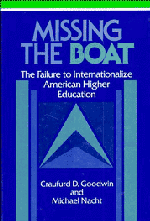Book contents
- Frontmatter
- Contents
- Introduction
- 1 Higher education looks abroad: historical trends
- 2 Who goes today? and who does not?
- 3 Individual costs and benefits
- 4 Campus attitudes
- 5 Obstacles to international experience
- 6 Issues for debate
- 7 Cases studies
- 8 Epilogue: missing the boat
- Appendix: institutions visited
- Index
7 - Cases studies
Published online by Cambridge University Press: 04 August 2010
- Frontmatter
- Contents
- Introduction
- 1 Higher education looks abroad: historical trends
- 2 Who goes today? and who does not?
- 3 Individual costs and benefits
- 4 Campus attitudes
- 5 Obstacles to international experience
- 6 Issues for debate
- 7 Cases studies
- 8 Epilogue: missing the boat
- Appendix: institutions visited
- Index
Summary
As we have recounted in earlier chapters, the overseas experiences of faculty serve a multitude of important purposes on the U.S. campus. In this chapter we illustrate these varied uses by summarizing a set of imaginative programs at five colleges and universities wherein faculty experience abroad was the decisive mechanism used to achieve a well-defined end.
Global Awareness Program of Wheaton College
Wheaton is a small, high-quality liberal arts college in southern Massachusetts with a distinguished record of service to women that goes back well into the nineteenth century. However, as Wheaton entered the 1980s it faced a variety of serious problems. Alice Emerson, Wheaton's president, recognized that broadgauged internationalization of the entire college community was essential because of increasing international interdependence and the need to educate for global citizenship. It seemed to her that the times dictated it. Her sensitivity to the opportunity was heightened by a trip to China in 1980, after which she was deeply impressed by the extent to which American students, despite the availability at Wheaton and elsewhere of conventional language, area study, and study abroad programs, remained largely ignorant of non-Western cultures. She perceived the chance to pursue a course that was both pedagogically sound and responsive to the particular needs of the college.
President Emerson concluded that change in the level of international awareness in a college community must begin among the faculty.
- Type
- Chapter
- Information
- Missing the BoatThe Failure to Internationalize American Higher Education, pp. 94 - 109Publisher: Cambridge University PressPrint publication year: 1991



